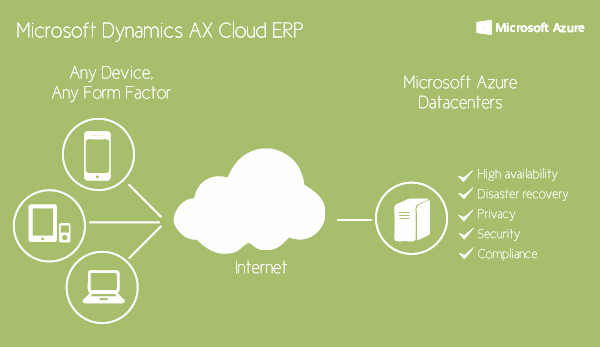Microsoft Dynamics AX - Deployment Model
DYNAMICS AX IN THE CLOUD
Microsoft Dynamics AX offers unmatched flexibility to deploy the system in on-premise data center, in the cloud, or in a hybrid model, all with a single unified code base. The cloud-based deployment option leverages the Microsoft Azure cloud, the leading cloud-based platform for businesses.
Choosing the cloud-based deployment of Microsoft Dynamics AX provides access to a global network of modern data centers, as well as the Microsoft Azure cloud platform’s industry-leading measures for security, privacy, and compliance.
To ensure maximum system uptime and availability, Microsoft provides high availability (HA) and disaster recovery (DR) configurations for all Dynamics AX clients at no additional charge.
- High Availability (HA) – Within a client’s Dynamics AX production environment, Microsoft provides redundancy in key areas of the Dynamics AX architecture to prevent a single point of failure.
- Disaster Recovery (DR) – Microsoft also provides a fully replicated environment for Dynamics AX system in a secondary Azure data center, so we can failover to a copy of environment in the event of an unplanned natural disaster.
This ensures that ERP software will be up and running with unprecedented availability levels at the same low monthly price.
Benefits:
- Native cloud deployment. Reduce IT overhead and eliminate hardware investments by natively deploying Dynamics AX in the Microsoft Azure cloud.
- Full redundancy. Guarantee maximum uptime with High Availability and Disaster Recovery configurations included for all customers at no additional charge.
- Pure browser interface. Simplify user provisioning and management with a native web browser user interface that requires no client software or browser plug-ins.
- Any device, any form factor. Gain full mobility by running Dynamics AX on any platform, any device, and any form factor using a modern HTML5 user interface.
- Active Directory integrated. Leverage corporate Active Directory authentication to simplify management and synchronization of user accounts through Active Directory Federation Services.
Microsoft Azure Security, Privacy and Compliance
Microsoft has heavily invested in the industry’s most comprehensive security, privacy, and compliance framework, helping Azure gain a reputation as a trusted cloud platform. This includes:
- Comprehensive infrastructure and network protection measures such as intrusion detection, anti-virus/anti-malware protection, and ongoing penetration testing, as well as proactive monitoring, logging and patch management practices.
- Industry-standard data protection technologies, including a wide range of encryption capabilities, secure transport protocols (SSL, TLS), and data segregation techniques.
- A “Privacy by Design” policy and restrictions on access to data to ensure that most important information is safeguarded.
- ISO 27001 certification, a broad international information security standard, along with annual audits for ISO compliance.
- Audits to the SOC (Service Organization Control) reporting framework for SOC 1 Type 2 and SOC 2 Type 2 controls, attesting to the design and effectiveness of its controls for security, availability, and confidentiality.
